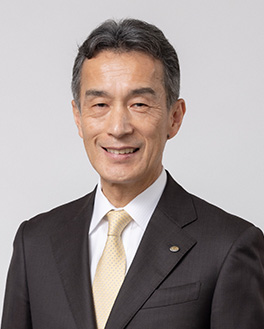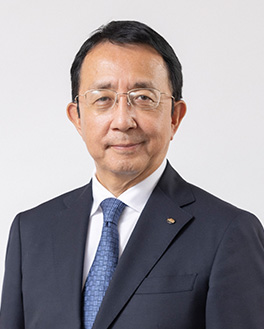Message from Top Management
-

Kirin Holdings Company, Limited
President & CEO
Yoshinori Isozaki
The year 2022 could be described as the year when the importance of sustainable use of natural capital is internationally acknowledged. The Kirin Group was a global pioneer in experimenting the LEAP approach*1 advocated by the Taskforce on Nature-related Financial Disclosures (TNFD), and highly recognized by stakeholders and the media both in Japan and overseas. Corporate activities are generally regarded to have a negative impact on nature, but it has recently become clear that businesses can also have a positive impact on nature. The term "nature positive*2 " is gaining attention as a phrase that refers to halting the loss of biodiversity and putting it on a recovery trajectory. In our ecosystem surveys conducted through joint research with National Agriculture and Food Research Organization*3 at Château Mercian Mariko Vineyard since 2014, we have demonstrated through scientific research that the conversion of derelict land to the use of hedged and grass-cultivated vineyards has enriched nature. The concept of Satoyama is behind the “nature positive” results at Mariko Vineyard. The vineyard cultivated in hedgerow style has created grasslands, which are facing a crisis of being endangered, and revived a balanced Satoyama environment in harmony with the surrounding rice paddies, forests, and water sources, which in turn has helped to promote the recovery of biodiversity. This year Mariko Vineyard was designated by the Ministry of the Environment as an approved site contributing to the “30 by 30” target to make at least 30% of land and sea into conservation areas, as adopted at the Fifteenth meeting of the Conference of the Parties (COP15) to the UN Convention on Biological Diversity in 2022. It is fair to say this is a good example of how businesses can create value for local economies and the natural environment. In Japan, we believe that human activities and nature can coexist in harmony, as is evident in traditional Satoyama landscapes. Humans should not recklessly interfere with remaining areas of untouched nature, but the reality is that most of the natural environment in Japan is "secondary nature," which has been protected through human intervention, resulting in the creation of various types of value for society. The abandonment of farmland will result in the loss of this “secondary nature.” When humans continue to work in harmony with nature, both nature and local economies are protected. Approaches similar to the Japanese idea of Satoyama landscapes are also commonly held in East Asia and Southeast Asia. On the other hand, in the West, many people view the lives and activities of humans, including agriculture, as destructive to nature, and believe that we must keep humans away in order to protect nature. At present, the methodologies for setting scientific targets for nature are under consideration in the SBTN framework and guidance on nature-related risk management and disclosure is under consideration in the TNFD framework. If the creation of global standards related to natural capital is led only by Western countries, as has previously been the case with climate change, differences in ways of thinking about how humans relate to nature could lead to a situation that does not fit the realities of East and Southeast Asia, including Japan. I consider the idea of Satoyama landscapes to be a concept for sustaining natural capital that has originated in Japan, but which is valid around the world. By actively participating in global initiatives related to rulemaking for natural capital, Kirin hopes to extend to the rest of the world an understanding that there are types of nature that are preserved and restored through proper human involvement, rather than simply keeping businesses away from nature, as well as the usefulness of the Satoyama landscape concept.
- See page 18 of the Kirin Group Environmental Report 2022 for trial disclosure based on the LEAP approach. https://www.kirinholdings.com/en/investors/library/env_report/
- To halt and reverse the loss of biodiversity and put it on a recovery path, the G7 adopted the "G7 2030 Nature Compact" at the G7 meeting held in the UK in 2021 in which it was clearly stated that "nature will be positively transformed by 2030 and fully restored by 2050, compared to 2020 levels."
- The communication name for the National Agriculture and Food Research Organization. With about 1,700 researchers, it is the largest research institute in Japan that conducts research and development in a wide range of fields from basic to applied for the development of Japan's agriculture and food industry.
FSC®C137754
-

Kirin Holdings Company, Limited
(Officer in Charge of CSV Strategy,
Group Environmental Manager)
Ryosuke Mizouchi
In 2022, the United Nations Conference of the Parties to the Framework Convention on Biological Diversity (COP15) was held in Montreal, and a new global goal of "30 by 30" was set forth in the Kunming Declaration to make 30% of the world's land and sea areas into conservation areas. In terms of natural capital, companies are now required to assess the risks and opportunities associated with their entire value chain, and to address them in light of the impact of climate change. At Kirin, our style has long been a holistic approach to natural capital and the climate change that affects it. Last year, in the Kirin Group Environmental Report 2022, we disclosed information on a trial basis in line with the "LEAP" approach advocated in the beta version of the “Task Force on Nature-related Financial Disclosures (TNFD)” framework. LEAP is a method for companies to understand the risks and opportunities associated with natural capital through analysis and assessment based on a process where they Locate the interface with nature, Evaluate priority dependencies and impacts, Assess material risks and opportunities, and Prepare to respond and report. LEAP is an excellent tool for revealing that agricultural products and water, which are essential for determining our product's characteristics, are "unique" and "dependent" on "locations." In line with the LEAP framework, we have been able to provide information in a simple form concerning matters such as our support for the acquisition of sustainable farming certification by tea growers in Sri Lanka, which was previously difficult to explain owing to the complicated relationships involved, and our different approaches to water resources in Japan and Australia, which have different water risks and stresses. The same can be said of SBTN's "AR3T Framework," under which we also disclosed information on a trial basis at the same time, in 2022. In March 2023 in New Belgium Brewing (Colorado, US), together with the TNFD, we tested the discussion on our businesses with prototype model for scenario analysis of natural capital and published the details in the draft TNFD guidance beta v0.4 and at a workshop hosted by the TNFD Consultation Group of Japan. By actively participating in the pilot program, we will contribute to making the disclosure framework more practical and enhance our level of skill in this area at an early stage. There are almost no agreed-upon scenarios for natural capital, and the dependence and impact of businesses on natural capital varies greatly from location to location. Accordingly, we must start by identifying the interface between our businesses and nature. At Kirin, we will not begin an exhaustive analysis and assessment of challenges related to natural capital, but instead we will proceed by drawing on specific knowledge from individual areas where our businesses have a strong relationship with the community, and utilizing the TNFD framework and the SBTs for Nature methodology, taking into account materiality in our businesses. In this year's environmental report, based on the TCDF framework, we integrated the beta version of the TNFD, and explained the Kirin Group's environmental management as comprehensively as possible. The message of the Kirin Group’s Environmental Vision 2050 is "Enrich the Earth with Positive Impact." Behind this message lies Kirin's brewing philosophy of "Reverence for Life." Beer can only be brewed with the blessings of nature in the form of raw materials - crops, water and yeast. Our approach is that we must respect life and humbly learn from its power, precisely because our businesses depend on “life” itself. We will lead the world in ensuring the sustainability of natural capital, as we have done for climate change, because the sustainability of our businesses depends on the blessings of nature.